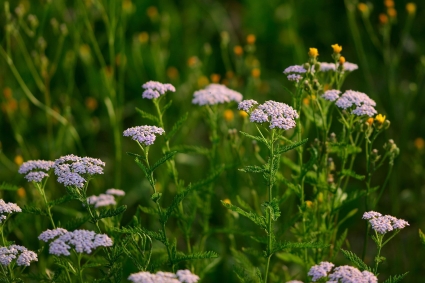A beautiful ground cover plant, alchemilla can be used in borders. In the wild, it is generally found in places like woods or wet meadows. Snails and slugs love its young leaves.
How to recognize it ?
The Latin name is Alchemilla vulgaris. Some vernacular names allow to name it as lion's foot, griffon's foot, rabbit's foot, Notre-Dame's coat, dew door or alchemists' herb.
It is a perennial and tapering plant with deciduous foliage and which has a thick and coriaceous rhizome.
- Its leaf is round, lobed and toothed;
- Its stems are smooth and tinted of red;
- Its flowers are very small, of yellow green color, joined together in tight heads. They bloom from May to August.
How to grow it ?
- Exposure : sun or half-shade
- Hardiness up to -20 °C
- Height at flowering : about 30 cm
- Harvested parts : aerial parts
- Sowing : in a bucket in an outdoor nursery from January, the seeds must be varnished before sowing, they will germinate at about 18 °C.
- Transplanting : in a bucket in May.
- Planting : in spring, after risk of frost
- Sowing in the open ground : in April-May or in the fall.
- Distance between plants : 30 cm.
- Maintenance : remove the faded flowers, prune the feet after flowering to avoid the invasion.
- Multiplication : division of clumps at the very beginning of spring.
- Ground : any fresh, rich in humus and well drained ground.
- Compost requirements : at planting and in abundance in spring.
- Mulching : to keep the freshness especially in summer.
- Water requirements : the soil must be kept slightly moist.
- Possible culture in window box : so that it extends, small watering 1 to 2 times per week.
How to harvest it ?
One collects the aerial parts (flowers, sheets and stems) with flowering. They are put to dry to make infusions. We can also make alchemilla tincture. The young leaves can be consumed cooked and in gratins.
The medicinal virtues of the Alchemilla
The Alchemilla have many medicinal virtues :
- astringent, anti-inflammatory, antihemorrhagic and decongestant : it is indicated for the painful and too abundant rules, the lesions post-delivery, the circulatory disorders related to the menopause;
- antidiarrheal : it soothes irritation, regulates secretions and fights against pathogenic germs. It is necessary to respect the recommended dosage because the alchemilla could support the constipation;
- progestogen : its use is relevant in pre-menopausal syndrome with fibroid uterus and tendency to genital hemorrhage.
Updated on 10 February 2023 at 22:48







